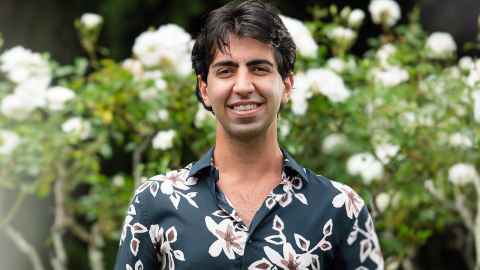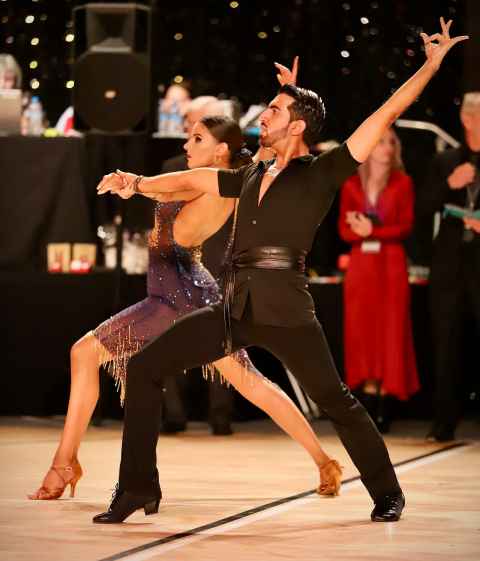Hossein Jahedi: doctoral research and dance moves
1 March 2022
The loss of his grandmother to pancreatic cancer fuels Hossein Jahedi’s drive to help solve the challenges of this aggressive, challenging disease.

Over the past year, Hossein Jahedi has become more determined than ever to add to the pool of knowledge about the components, causes and potential cures for pancreatic cancer.
Hossein is a doctoral candidate in the Faculty of Medical and Health Sciences, whose research focuses on the role of hyaluronic acid in the progression of pancreatic cancer.
“In people with pancreatic cancer, hyaluronic acid absorbs water from the blood vessels surrounding the tumour, which leads to the collapse of those vessels. When they collapse, it prevents chemotherapies getting in.
“Scientists are figuring out how we can deplete or break down the hyaluronic acid in the tumour, so chemotherapies can do their job.”
They have also found that hyaluronic acid attaches to certain receptors in pancreatic cancer cells, making the cancer more aggressive.
“There was a drug that went on to phase-three clinical trials that depleted the hyaluronic acid in pancreatic cancer tumours,” says Hossein. “But it was discontinued because of the combined side effects of the new drug and the chemotherapies. So, it’s about finding a drug that can do that job with minimal side effects.”
For Hossein, the research is personal as well as professional.
In February 2020, his grandmother was diagnosed with pancreatic cancer. She was staying in Brisbane, with Hossein’s Iranian-born parents. When lockdown came in March, it meant Hossein, who had been intending to visit his grandmother in Brisbane, couldn’t. Sadly, she passed away a few months later.
“It happened very quickly so it was tough, and the only blessing is she was with my parents. She is always at the back of my mind and fuelling my drive to push through with this research.”
Hossein was born in Iran, but his family moved to Malaysia when he was 14. That was where he went to university and, for his honours degree, began his research on pancreatic cancer.
“I was interested in continuing and saw a scholarship funded by the Hugo Charitable Trust for a researcher in pancreatic cancer at the University of Auckland.
“I applied and that’s how I came to New Zealand. It has been great, but it was a challenge during lockdowns. You plan and conduct experiments that take week or months, and they get disrupted. Then re-setting up these experiments once out of lockdown takes time too. My work involves using pancreatic cancer cells in Petri dishes. One good thing is that I can store them in the freezer when I’m not working with them.”
By 2030, it’s estimated that pancreatic cancer will be the second most-common cause of cancer-related mortality in the world.
Cells weren't the only thing on ice during lockdown.
Hossein is a Latin American dancer who has competed in national competitions so has had to keep fit by running around Mission Bay and, when in lockdown, dancing by himself.
“There was a bit of dancing alone in the living room,” he laughs. “It’s a good thing the windows act as mirrors at night! But I had to keep match-fit for when it started again. During competition, you have to perform a minute and a half for each of five dances – about seven very energetic minutes. You must be fit enough to go through that with high energy and also make it entertaining. You don’t want to be huffing and puffing in the middle of the dance floor!”
Hossein began Latin American dancing – the likes of rumba, cha cha cha and jive – in Malaysia when he was around 17. It began by doing a few classes and eventually turned into something more serious.
“I just like doing things properly,” he says, adding that he thinks everyone should try Latin dance once in their lives.
His favourite dance style, of those most of us only know from Dancing with the Stars, is
the cha cha cha. “It’s a cheeky dance, quite flirtatious.”
In late 2021, it was more like flirting with himself, however 2022 is looking more hopeful on the dance front provided Omicron settles down.

In the meantime, he has plenty to get on with. Through Auckland’s extended lockdowns, Hossein worked on his thesis and also on writing a critical summary review of what other people have explored in his field of research.
“There’s a lot of new information that’s come up about why pancreatic cancer is so different from other types of cancer and why it’s hard to treat. Now it’s a matter of figuring out how to tackle it.
“If you look at the rate at which people have died from different malignancies over the past 20 years, there has been no improvement for pancreatic cancer. Breast cancer and lung cancer are more common, but in the past few years their deaths have been going down, but pancreatic cancer deaths have increased slightly.
“By 2030, it’s estimated that pancreatic cancer will be the second most-common cause of cancer-related mortality in the world, especially in developed countries.”
Part of the improvement in survival for other cancers is awareness and developments in treatment.
“Naturally, more funding has been going to find cures for common cancers – like breast, lung, or even prostate cancer. But looking at the data, more funding is needed for pancreatic cancer research to help save lives. Rather than coming to that conclusion in five or ten years, it’s better to think about it now, when there is a clear trend.”
The pancreas sits behind the stomach and has a dual function. It is involved in the body’s digestive processes and also makes hormones, for example, insulin needed to regulate sugar levels. The reason pancreatic cancer is hard to detect is because the pancreas is hidden which makes imaging difficult. Its symptoms are non-specific and, just as the tumour’s collapsed blood vessels make it difficult for chemotherapy to get in, they also make it hard for pancreatic cancer markers to get out into the bloodstream.
“Imaging doesn’t work so well because of its anatomical position,” explains Hossein. “It’s a slimy sort of thing in the middle of all the organs.”
We need more diagnostic research to screen for things that come up in the blood early because symptoms of pancreatic cancer can be mistaken for other gastrointestinal problems.
Research shows that high levels of hyaluronic acid in the blood could be a potential marker.
“If we can see it early enough, it may be a good detection tool. We need more diagnostic research to screen for things that come up in the blood early because symptoms of pancreatic cancer can be mistaken for other gastrointestinal problems.”
Hossein is working on understanding what’s known as the stroma and stromal-targeting therapeutics in pancreatic cancer.
“Let me give you a medieval analogy for the stroma. Imagine pancreatic cancer as an army. Strong armies need a strong castle – they need to be based somewhere before they can go to other places. The stroma is the castle. It is made of bricks, structures, and gates that hold the army – or in this case the tumour. This castle prevents intruders from getting in – i.e., the drugs, the chemotherapy.
“What we are doing with my project is figuring out the function of hyaluronic acid within the castle and how it prevents drugs entering. Hyaluronic acid also makes the cancer army more aggressive, so has a double function.
“There has been a lot of attention on drugs that target that stroma. Some of them have failed, some are ongoing, but the fact that there are more, means, hopefully, there’ll be a point where we can get drugs that target that stroma ‘castle’ successfully.
“We need to gain a better idea of how hyaluronic acid exerts its effect, because that will help us pick targets for drug development.”
And then we have a chance of winning the war.
Denise Montgomery
Interested in Latin American dance classes at the University? See Audance Association on Instagram or contact Hossein Jahedi.
This article first appeared in the March 2022 edition of UniNews.
Hossein Jahedi’s doctoral research in the Surgical and Translational Research Centre (STaR) has been supported by the Hugo Charitable Trust, which has gifted a total of $1 million to support a range of STaR appointments and projects.